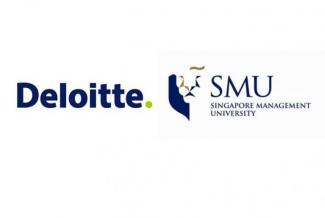
Singapore, 26 May 2015 (Tuesday) – Singapore Management University’s (SMU) Business Family Institute, or BFI@SMU, has partnered with Deloitte Southeast Asia (Deloitte) in a research titled ‘Asian Business Families Governance: Crossing the Chasm for Inter-Generational Change’.
This survey research is part of a three-year Business Families Research Programme (starting from Academic Year 2014) made possible by a second research grant from Deloitte to BFI@SMU, which was announced in September 2014. The first research grant from Deloitte had previously funded BFI@SMU’s inaugural survey in 2013, which focused on Asian Business Families Succession.
This latest research survey on governance was conducted by BFI@SMU between December 2014 and April 2015, and provides insights into the family and corporate governance strategies, platforms and structures which are in place in Asian business families, as well as the extent to which they provide effective and professional platforms for decision-making. Responses from over 100 business families were consolidated for the survey, which covered various territories in Asia, namely Singapore, China, Hong Kong SAR, Indonesia, India, Malaysia, Myanmar, Taiwan, Thailand, The Philippines and Vietnam.
More than 80% of the family members surveyed said that they cared about and were proud to be part of their businesses, however, only slightly more than half (56%) felt involved and included in the family business matters and decisions.
A majority (71%) of the business families demonstrated a strong desire to establish decision-making bodies, however, only 12% of the respondents have a working governing body elected by the family to deliberate and coordinate the interests of all family members (in the form of family assemblies, corporate boards and family committees). This shows that for most business families, family governance practices are still in the early stage of development and adoption.
The study found that while many families use formal governance practices, such as Board of Directors (84%), family committees (51%) and family assemblies (38%), informal governance practices are widely adopted – informal meetings (65%), family reunions (49%), and other modes of communication (49%). This preference for a ‘structured informality approach’ implies that the families are adopting fairly flat decision-making structures in their businesses. This allows them to be flexible and agile to change, and be proactive when it comes to adopting innovative thinking and practices for their businesses.
One pressing concern faced by business families is that of succession and continuity. 85% of the families surveyed said that they expect to see succession taking place in their businesses within the next five years, yet only 17% have systematic succession and training plans in place. The survey also revealed that while 68% of the families surveyed have not experienced a leadership transition, 31% have shortlisted potential successors; however, their succession processes are neither regularly reviewed nor updated by the corporate board.
To succeed in their businesses in the long term and to build sustained family harmony at the same time, business families can consider enhancing their commitment and effort towards strengthening current governance practices. In this regard, the survey noted that 84% of the respondents were willing to put in more than the requisite effort to ensure family business success. However, this needs to be a concerted family effort, rather than an individual’s effort.
Professor Annie Koh, SMU’s Vice President for Business Development, and Academic Director of BFI@SMU, said, “This study has provided critical insights into family and corporate governance – a component that is key to the building of sustainable Asian business families. I hope that today’s findings will encourage business families to address upfront and with priority the important issue of strengthening family governance practices.”
“As an Institute set up with the vision to facilitate knowledge-sharing among families, as well as to support their education and development, BFI@SMU is committed to providing the knowledge and platforms that they need in order to build family and business sustainability. BFI@SMU and Deloitte have already begun to develop a set of Asian-focused case studies and teaching materials to accompany master classes on family governance, build management capabilities for family firms, and develop family leadership and entrepreneurship. These will be ready in 2016. In 2017, a book featuring exemplary family businesses and practices will also be produced so that more Asian business families can benefit. I am grateful to Deloitte for their strong support and for the confidence they have placed in BFI@SMU,” she added.
Mr Tam Chee Chong, Deloitte Southeast Asia’s Regional Managing Partner of Financial Advisory Services, enthused, “We look forward to a continued and successful partnership with BFI@SMU as a knowledge and research partner. This research survey on governance reinforces our shared vision for the Business Families Research Programme in helping families build strong foundations in their business and family values.”
“The next five years will be critical as 85% of business families surveyed are expecting to undertake succession planning. We hope that these new insights will enable business families to establish a clearer framework for family governance and move current practices into best practices. A good and effective governance structure is imperative for the preservation of both the family and the business,” he added.
_____________________________________________
Media Contacts
SMU
Huang Peiling
Senior Assistant Director, Corporate Communications
DID: +65 6828 0964
Email: plhuang [at] smu.edu.sg (plhuang[at]smu[dot]edu[dot]sg)
Deloitte
Marie Li
Manager, Marketing & Communications
DID: +65 6800 3717
Email: meijli [at] deloitte.com (meijli[at]deloitte[dot]com)
The full report can be found here: http://bfi.smu.edu.sg/sites/news.smu.edu.sg/files/bfi/BFI_SMU_Deloitte_report_2015_WEB_260515.pdf